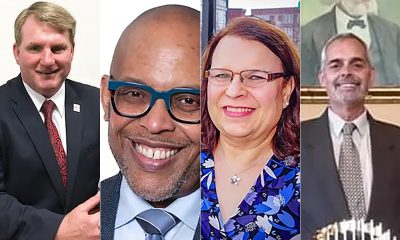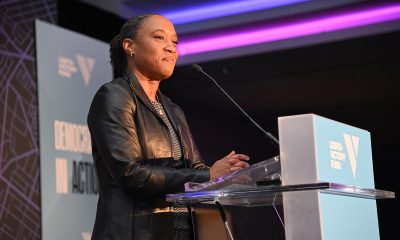News
Tom Chorlton, gay rights leader, author dies at 67
Former D.C. resident co-founded nat’l LGBT Democratic group
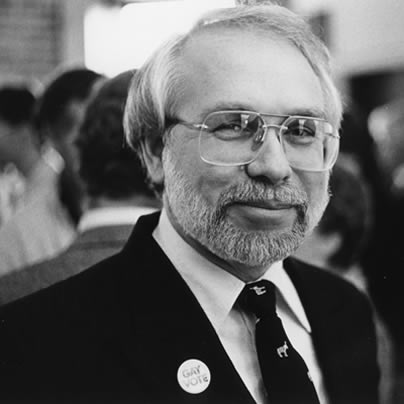
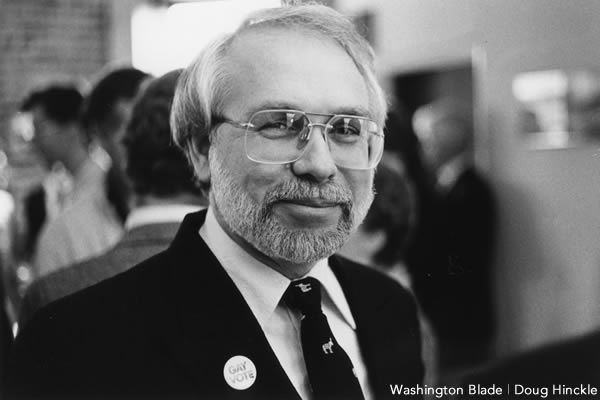
Tom Chorlton, a longtime advocate of LGBT rights, died Jan. 5 from complications associated with leukemia. (Washington Blade archive photo by Doug Hinckle)
Tom Chorlton, a longtime advocate of LGBT rights and former D.C. resident who taught political science at the College of Charleston in South Carolina, died Jan. 5 from complications associated with leukemia. He was 67.
Chorlton has been credited with playing a key role in the early 1980s in organizing support for gay rights within the Democratic Party. Among other endeavors, he helped found the National Association of Gay and Lesbian Democratic Clubs in 1982 and served as its first executive director from 1982 to 1987.
While living in D.C. from the mid-1970s to the early 1990s, Chorlton advocated for LGBT rights on a local and national level. He served as president of D.C.’s Gertrude Stein Democratic Club from 1981 to 1982 and ran as a candidate for an at-large seat on the D.C. City Council in 1988 under the banner of the D.C. Statehood Party.
Although he lost his Council race, his role as the first serious openly gay candidate for a seat on the Council opened the way for the election in subsequent years of gay D.C. Council members David Catania (I-At-large) and Jim Graham (D-Ward 1).
Friends and associates say Chorlton had a dual passion for LGBT rights and political science, with a strong interest in American history during the period just before and after the Revolutionary War.
As an assistant professor at the College of Charleston, Chorlton taught courses on the American Presidency and Politics of the American Revolution up until October 2013, when he was diagnosed with leukemia.
In 2012, after years of research and writing that Chorlton called a labor of love, he completed and published his book, “The First American Republic: 1774-1789.” The book consists of profiles of the 14 little-known leaders of the American Revolution who served as president of the Continental Congress from the time it was formed in 1774 to 1789, when George Washington took office as the nation’s first elected president under the new U.S. Constitution.
“What few Americans realize is that there had been a fully functioning national government prior to 1789,” Chorlton wrote in his book. “It was called the Continental Congress and it was, in every respect, the First American Republic (1774-1789).”
Deacon Maccubbin, former owner of D.C.’s Lambda Rising bookstore and a longtime friend of Chorlton’s, said Chorlton was born in Illinois, where his parents adopted him and raised him in the City of Belleville.
Chorlton received a bachelor’s in political science in 1968 from St. Louis University. Upon graduation, he served as a teacher in the Peace Corps in Kenya before returning to the U.S., where he worked in Washington in 1975 on the staff of U.S. Rep. Melvin Price (D-Ill.).
He earned his master’s degree in government administration in 1977 at Webster University in Missouri. During his time of studies there he was employed as a local government specialist with the St. Louis Area Council of Governments.
Shortly after leaving Washington in the early 1990s, Chorlton taught history and government at Columbia College’s Lake Campus in central Missouri. He began his post as an assistant professor at the College of Charleston in 2003, according to Erin Blevins, administrative coordinator for the college’s Department of Political Science.
Blevins said among the courses Chorlton taught were LGBT Politics, American Government, Contemporary Political Issues, Politics of the American Revolution, and the U.S. Presidency.
Kurt Vorndran, who served as president of the Gertrude Stein Democratic Club in D.C. several years after Chorlton held that post, credits Chorlton with being among the first to organize a political fundraising dinner for a gay rights cause in 1981 on behalf of the Stein Club.
Vorndran said the Stein Club’s 1981 dinner, held at the Hyatt Regency Hotel, drew hundreds of people, including members of Congress, then-D.C. Mayor Marion Barry, and many other D.C. elected officials and straight allies, such as labor union and civil rights leaders.
“At the time, very few, if any, national or local LGBT groups put on this type of political banquet that attracted big name politicians and media coverage,” Vorndran said. “This was something Tom started.”
Maccubbin and his husband Jim Bennett, who are serving as executors of Chorlton’s estate, said in a statement that plans for a memorial service would be announced shortly. The statement says a portion of Chorlton’s ashes would be interred at St. Michael’s Episcopal Church in Charleston and at a family plot in Belleville, Ill.
“Another small portion of his ashes will be scattered in Antarctica, the only continent Tom had not yet visited,” the statement says. “He has travelled extensively all his life, beginning with his Peace Corps service, and has been to more than 50 countries, including regions as diverse as Mongolia and Easter Island, Fiji and Kenya, Moscow, Beijing and Iran,” the Maccubbin-Bennett statement says.
“Those who believe in heaven know that Tom is there now with his mom and his canine friends who went before,” Maccubbin and Bennett said in a separate statement. “Those who don’t believe in the afterlife know that Tom created a heaven right here on earth, and shared it with all of us. He will live in all of our hearts forever.”
Maccubbin said Chorlton’s life will be celebrated in a memorial service at St. Michael’s Episcopal Church in Charleston on Jan. 14, with interment to take place in the churchyard. He said that in lieu of flowers, memorial donations may be made by check payable to the Tom Chorlton Memorial Fund, PO Box 1892, Folly Beach, SC 29439.
Maryland
Montgomery County police chief discusses arrest of trans student charged with planned school shooting
County executive tells news conference student’s trans identity is irrelevant to criminal charge
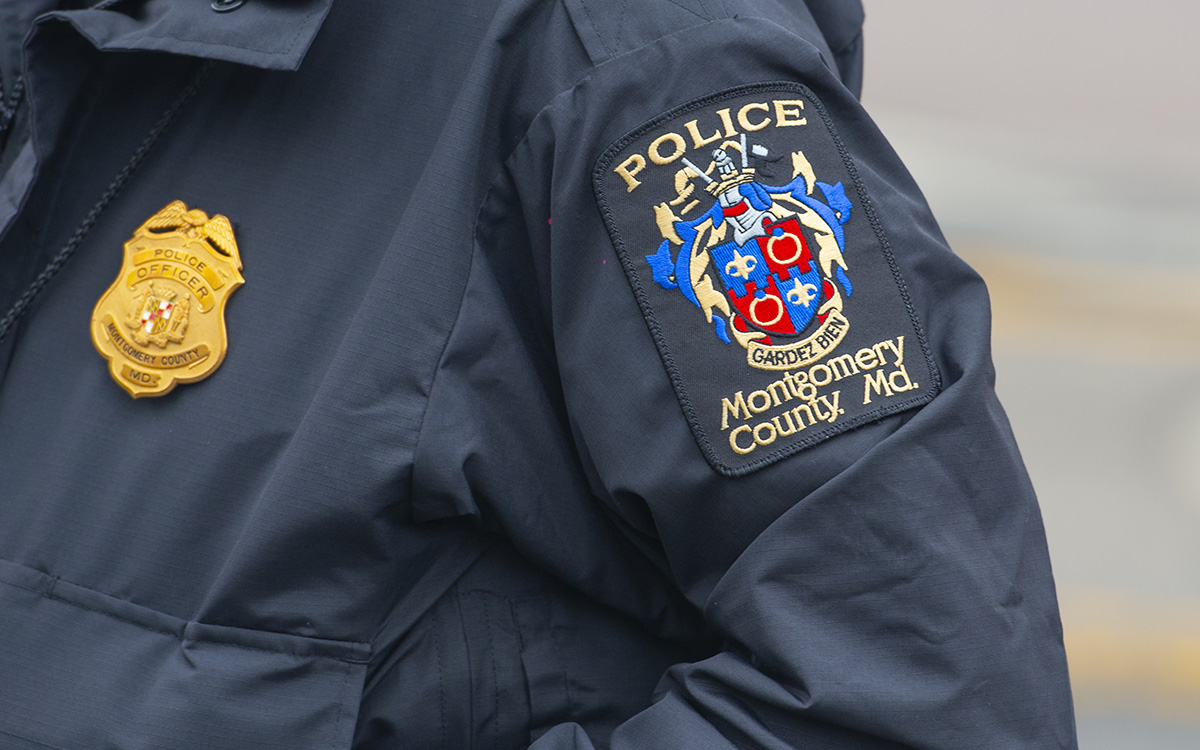
Montgomery County, Md., Police Chief Marcus Jones joined other county and law enforcement officials at a news conference on Friday, April 19, to provide details of the police investigation and arrest of an 18-year-old high school student charged two days earlier with threats of mass violence based on information that he allegedly planed a mass shooting at the high school and elementary school he attended in Rockville, Md.
In charging documents and in a press released issued on April 18, Montgomery County Police identified the arrested student as “Andrea Ye, of Rockville, whose preferred name is Alex Ye.”
One of the charging documents states that a friend of Ye, who police say came forward as a witness who played a crucial role in alerting authorities to Ye’s threats of a school shooting, noted that Ye told the witness that Ye identified as the transgender student he wrote about as a character in a 129-page manifesto outlining plans for a school shooting. Police have said Ye told them the manifesto was a fictional story he planned to publish.
At the news conference on Friday, Police Chief Jones and other law enforcement officials, including an FBI official and Montgomery County Executive Marc Elrich, referred to the student as Alex Ye and Mr. Ye. None of the officials raised the issue of whether Ye identified as a transgender man, seven though one of the police documents identifies Ye as a “biological female.”
County Executive Elrich appeared to express the views of the public officials at the news conference when one of the media reporters, during a question-and-answer period, asked Elrich why he and the others who spoke at the news conferment failed to “admit that this individual was transgender.”
“Because it’s not a lead,” Elrich replied, asking if the press and law enforcement authorities should disclose that someone arrested for murder is “a white Christian male who’s heterosexual.” Elrich stated, “No, you don’t – You never publish somebody’s sexual orientation when we talk about this. Why you are focusing on this being a transgender is beyond me. It’s not a news story. It is not a crime to be transgender.”
The reporter attempted to respond but was cut off by the press conference moderator, who called on someone else to ask the next question.
In his remarks at the press conference Chief Jones praised the so far unidentified witness who was the first to alert authorities about Ye’s manifesto appearing to make threats of a mass school shooting.
“Now, this is a situation that highlights the critical importance of vigilance and community involvement in preventing potential tragedies,” Jones said. “I commend the collaborative efforts of the Montgomery County Police Department, the Federal Bureau of Investigation, the Rockville City Police Department, and the Montgomery County Public Schools, as well as Montgomery County Health and Human Services,” he told the gathering.
“Thanks to their swift action and cooperation a potentially catastrophic event was prevented,” Jones said.
Jones pointed out that during the current school year, police have received reports of 140 threats to the public schools in Montgomery County. He said after a thorough investigation, none of them rose to the level where an arrest was made. Instead, police and school officials took steps to arrange for the student making the threats and their parents to take remedial action, including providing mental health services.
“But this case is different,” Jones said. “This case is entirely different that takes it to a different level. It was a concerned witness who brought this matter to light by rereporting the suspect’s manifesto to the authorities. This underscores the value of community engagement and the ‘see something say something’ approach,” he said.
Jones mentioned at the press conference that Ye was being held without bond since the time of his arrest but was scheduled to appear in court for a bond hearing on Friday shortly after the press conference took place to determine whether he should be released while awaiting trial or continue to be held.
In his manifesto obtained by police, Ye writes about committing a school shooting, and strategizes how to carry out the act. Ye also contemplates targeting an elementary school and says that he wants to be famous.
In charging documents reported on by WJLA 7 and WBAL 11, the 129-page document, which Ye has referred to as a book of fiction, included writings that said, in part:
“I want to shoot up a school. I’ve been preparing for months. The gun is an AR-15. This gun is going to change lives tomorrow … As I walk through the hallways, I cherry pick the classrooms that are the easiest targets. I need to figure out how to sneak the gun in. I have contemplated making bombs. The instructions to make them are surprisingly available online. I have also considered shooting up my former elementary school because little kids make easier targets. High school’s the best target; I’m the most familiar with the layout. I pace around my room like an evil mastermind. I’ve put so much effort into this. My ultimate goal would be to set the world record for the most amount of kills in a shooting. If I have time, I’ll try to decapitate my victims with a knife to turn the injuries into deaths.”
Federal Government
Lambda Legal praises Biden-Harris administration’s finalized Title IX regulations
New rules to take effect Aug. 1

The Biden-Harris administration’s revised Title IX policy “protects LGBTQ+ students from discrimination and other abuse,” Lambda Legal said in a statement praising the U.S. Department of Education’s issuance of the final rule on Friday.
Slated to take effect on Aug. 1, the new regulations constitute an expansion of the 1972 Title IX civil rights law, which prohibits sex-based discrimination in education programs that receive federal funding.
Pursuant to the U.S. Supreme Court’s ruling in the landmark 2020 Bostock v. Clayton County case, the department’s revised policy clarifies that discrimination on the basis of sexual orientation and gender identity constitutes sex-based discrimination as defined under the law.
“These regulations make it crystal clear that everyone can access schools that are safe, welcoming and that respect their rights,” Education Secretary Miguel Cardona said during a call with reporters on Thursday.
While the new rule does not provide guidance on whether schools must allow transgender students to play on sports teams corresponding with their gender identity to comply with Title IX, the question is addressed in a separate rule proposed by the agency in April.
The administration’s new policy also reverses some Trump-era Title IX rules governing how schools must respond to reports of sexual harassment and sexual assault, which were widely seen as imbalanced in favor of the accused.
Jennifer Klein, the director of the White House Gender Policy Council, said during Thursday’s call that the department sought to strike a balance with respect to these issues, “reaffirming our longstanding commitment to fundamental fairness.”
“We applaud the Biden administration’s action to rescind the legally unsound, cruel, and dangerous sexual harassment and assault rule of the previous administration,” Lambda Legal Nonbinary and Transgender Rights Project Director Sasha Buchert said in the group’s statement on Friday.
“Today’s rule instead appropriately underscores that Title IX’s civil rights protections clearly cover LGBTQ+ students, as well as survivors and pregnant and parenting students across race and gender identity,” she said. “Schools must be places where students can learn and thrive free of harassment, discrimination, and other abuse.”
Maryland
Rockville teen charged with plotting school shooting after FBI finds ‘manifesto’
Alex Ye charged with threats of mass violence

BY BRETT BARROUQUERE | A Montgomery County high school student is charged with what police describe as plans to commit a school shooting.
Andrea Ye, 18, of Rockville, whose preferred name is Alex Ye, is charged with threats of mass violence. Montgomery County Police and the FBI arrested Ye Wednesday.
The rest of this article can be found on the Baltimore Banner’s website.
-

 District of Columbia2 days ago
District of Columbia2 days agoReenactment of first gay rights picket at White House draws interest of tourists
-

 District of Columbia2 days ago
District of Columbia2 days agoNew D.C. LGBTQ+ bar Crush set to open April 19
-

 Arizona2 days ago
Arizona2 days agoAriz. governor vetoes anti-transgender, Ten Commandments bill
-

 Africa4 days ago
Africa4 days agoUgandan activists appeal ruling that upheld Anti-Homosexuality Act



